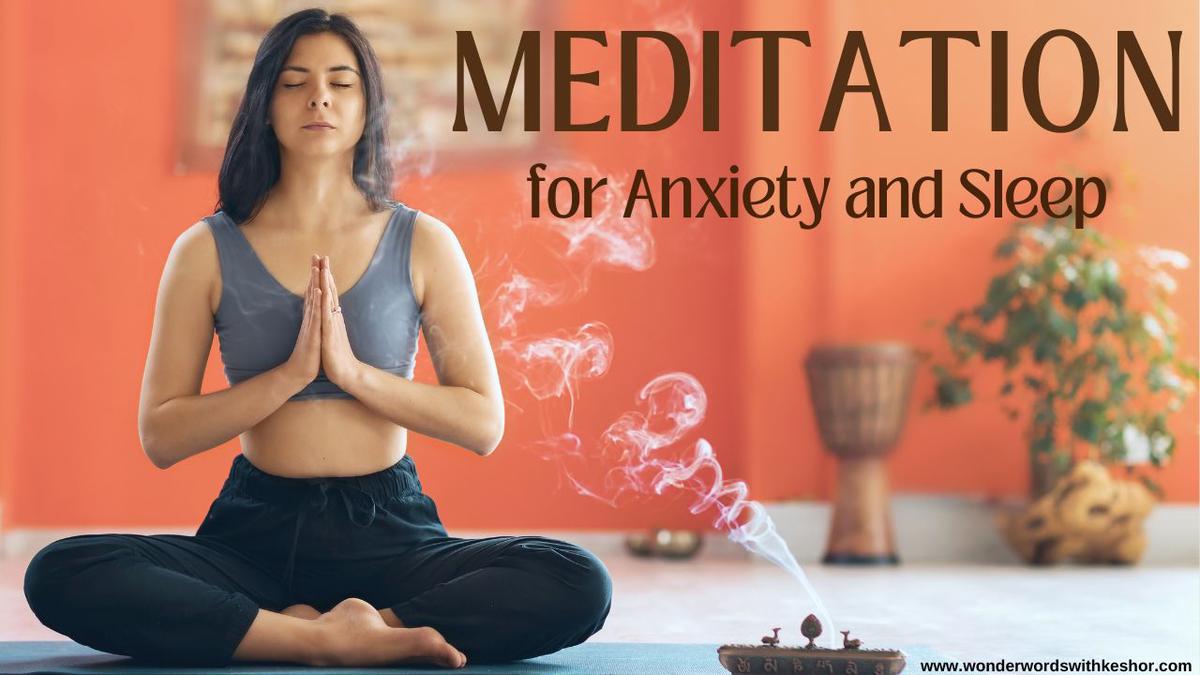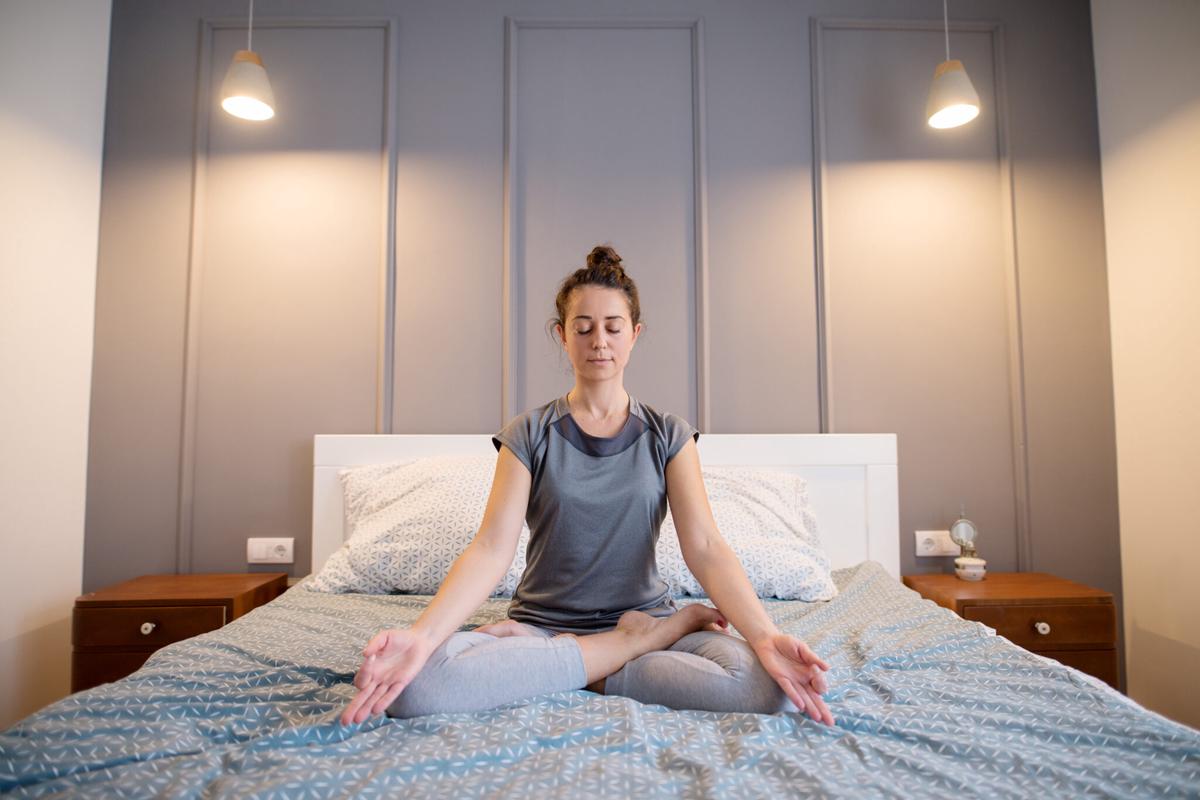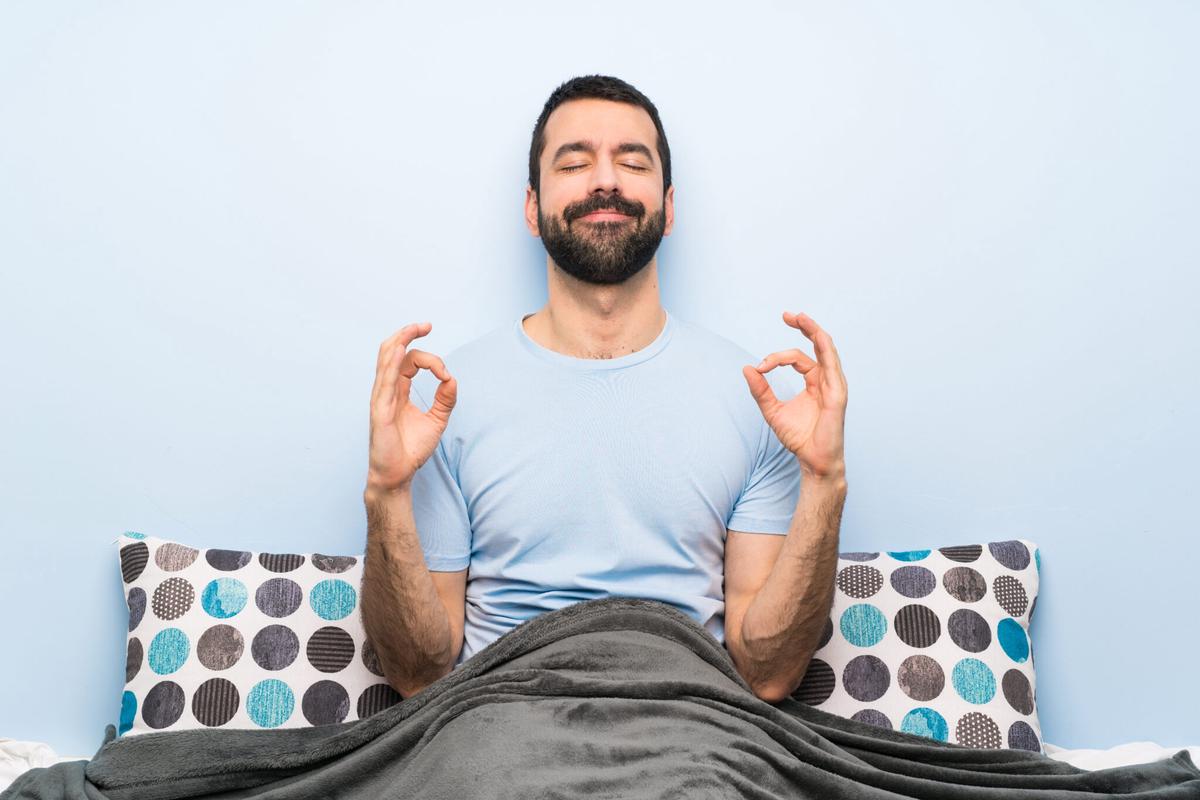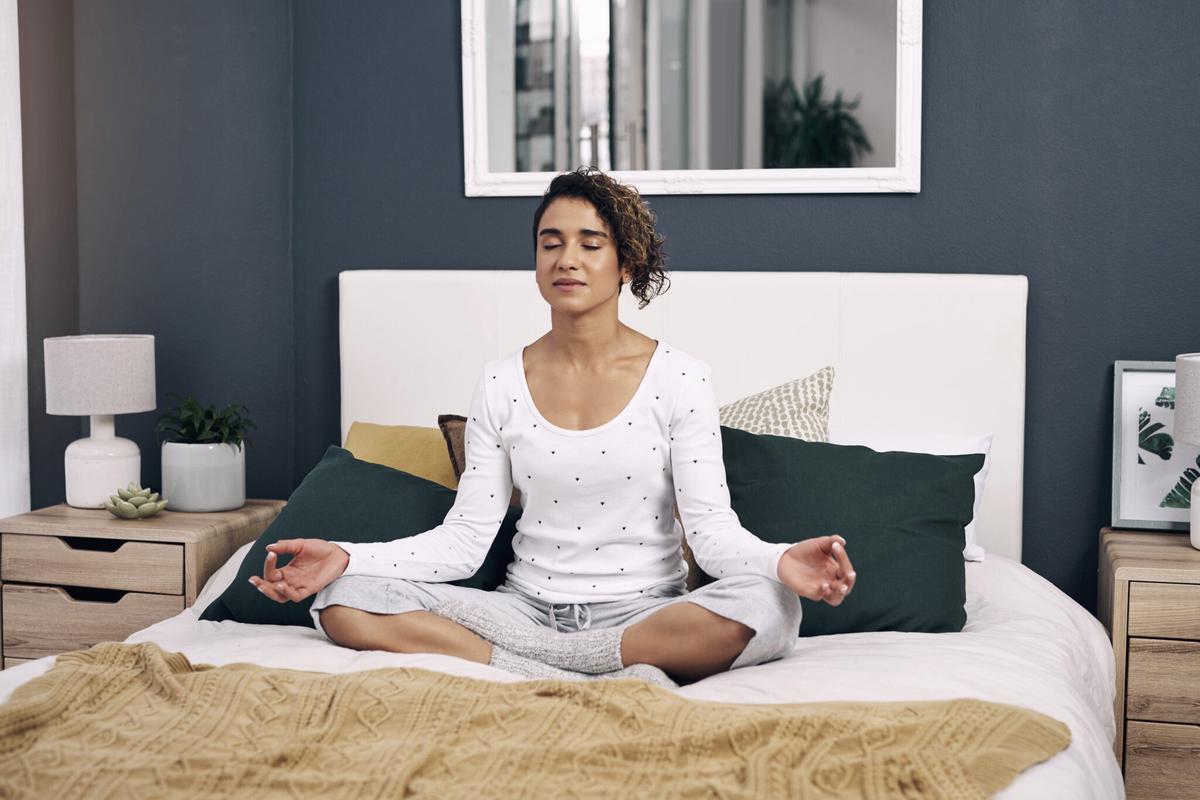

Introduction
Meditation for Anxiety and Sleep: Anxiety and sleep disorders have become prevalent issues in today’s fast-paced world. The demands of modern life often lead to stress and anxiety, which, in turn, disrupt our sleep patterns. It’s a vicious cycle that affects our overall well-being. The good news is that meditation, a holistic practice with historical roots and modern adaptations, can be a powerful tool for managing anxiety and improving sleep quality.
In this comprehensive article, we will delve into the world of meditation and explore its potential to alleviate anxiety and enhance your sleep. We’ll discuss various meditation techniques, scientific evidence supporting their effectiveness, and practical tips for incorporating meditation into your daily routine. So, let’s embark on a journey to discover how meditation can be a game-changer for your mental and physical health.
Table of Contents
- Introduction
- Use 9+ Simple Ways of Meditation for Anxiety and Sleep: Find Inner Peace
- Understanding Anxiety and Sleep Disorders
- What is Anxiety?
- The Importance of Quality Sleep
- Meditation as a Holistic Approach
- What is Meditation?
- Scientific Basis of Meditation
- Meditation and Anxiety
- Reducing Stress through Meditation
- Enhancing Emotional Regulation
- Promoting Relaxation
- Case Studies of Anxiety Reduction through Meditation
- Meditation and Sleep
- Promoting Better Sleep Quality
- Reducing Sleep Onset Latency
- Improving Sleep Architecture
- Case Studies of Improved Sleep with Meditation
- Getting Started with Meditation
- Setting Up a Meditation Space
- Finding the Right Meditation Technique
- Meditation Tools and Resources
- Overcoming Common Meditation Challenges
- Meditation and Breath Control
- The Connection Between Breath and Meditation
- Breathing Patterns for Anxiety Reduction
- Breathing Techniques for Better Sleep
- Mindfulness Meditation
- Core Principles of Mindfulness
- Mindfulness Meditation for Anxiety
- Mindfulness Meditation for Sleep
- Transcendental Meditation
- Understanding TM
- TM for Anxiety Reduction
- TM for Improved Sleep
- Guided Meditation
- What is Guided Meditation?
- Anxiety Reduction through Guided Meditation
- Guided Meditation for Better Sleep
- Scientific Evidence and Studies
- Clinical Trials on Meditation
- Neuroscience and Meditation
- The Impact of Meditation on Anxiety and Sleep: Research Findings
- Incorporating Meditation into Daily Routine
- Morning vs. Evening Meditation
- Frequency and Duration
- Consistency and Progress
- Real-Life Success Stories
- Personal Accounts of Anxiety Relief
- Testimonials of Improved Sleep
- Meditation as a Complementary Approach
- Combining Meditation with Traditional Therapies
- Meditation and Medication
- Meditation in Professional Psychological Care
- Tips for Success
- Patience and Persistence
- Journaling and Tracking Progress
- Seeking Professional Guidance When Needed
- Conclusion:
- References
- Author’s Note
- Disclaimer:
- Frequently Asked Questions (FAQs) –
Bedtime Meditation for Sleep and Anxiety | 15 Minute Stress Relief
Use 9+ Simple Ways of Meditation for Anxiety and Sleep: Find Inner Peace
Understanding Anxiety and Sleep Disorders
What is Anxiety?
Anxiety is a natural response to stress, but when it becomes excessive and chronic, it can be debilitating.
Anxiety disorders come in various forms, such as generalized anxiety disorder (GAD), social anxiety disorder, and panic disorder. These conditions can significantly impact your daily life, making it essential to find effective coping mechanisms.
The Importance of Quality Sleep
Sleep is a fundamental aspect of our well-being. It’s during sleep that our bodies and minds undergo essential processes for rejuvenation and recovery. Sleep disorders, such as insomnia and sleep apnea, can disrupt these processes, leading to a host of health issues, including increased anxiety.
Meditation as a Holistic Approach
What is Meditation?
Meditation is a practice that dates back thousands of years, with roots in various cultures and religions. Today, it has evolved into a diverse set of techniques, all aimed at achieving a state of mental clarity, relaxation, and heightened awareness. Some of the most popular meditation practices include mindfulness meditation, transcendental meditation, and guided meditation.
Scientific Basis of Meditation
The effectiveness of meditation is not merely anecdotal; there’s a scientific basis for its impact on the brain and body. Studies have shown that meditation can influence brain activity, reduce stress hormones like cortisol, and enhance the release of neurotransmitters associated with well-being, such as serotonin and dopamine.

Use 9+ Simple Ways of Meditation for Anxiety and Sleep: Find Inner Peace
Meditation and Anxiety
Reducing Stress through Meditation
Cortisol, often referred to as the stress hormone, can wreak havoc on your body and mind when its levels remain elevated. Meditation has been shown to reduce cortisol production, leading to a decrease in stress levels. By incorporating meditation into your daily routine, you can develop resilience to life’s challenges.
Enhancing Emotional Regulation
Anxiety often stems from difficulty in managing emotions. Meditation, particularly mindfulness meditation, can help individuals become more aware of their emotions and develop healthier ways to respond to them. It promotes emotional regulation, reducing the intensity and frequency of anxiety symptoms.
Promoting Relaxation
Meditation places a strong emphasis on the profound link between the mind and the body. By focusing on your breath, bodily sensations, or a specific mantra, you can induce a state of deep relaxation. This relaxation response counteracts the body’s stress response, leading to a calmer, more centered state of being.
Case Studies of Anxiety Reduction through Meditation
Real-life success stories underscore the potential of meditation in reducing anxiety. In case studies, individuals have reported significant improvements in their anxiety levels after consistent meditation practice. These stories serve as inspiration for those looking to alleviate their own anxiety.
Meditation and Sleep
Promoting Better Sleep Quality
Meditation has the power to noticeably improve the quality of your sleep. By calming the mind and reducing stress, it creates an ideal environment for restorative sleep. The connection between meditation and sleep quality is well-established in both ancient traditions and modern scientific research.
Reducing Sleep Onset Latency
Do you often struggle to fall asleep promptly? Meditation techniques specifically designed to induce relaxation can help reduce sleep onset latency. You can learn to let go of racing thoughts and gradually drift into a peaceful slumber.
Improving Sleep Architecture
A full night’s sleep consists of different sleep cycles, including deep sleep and REM (rapid eye movement) sleep. These cycles are essential for overall health. Meditation has been shown to improve sleep architecture, allowing you to experience more restful and rejuvenating sleep.
Case Studies of Improved Sleep with Meditation
Just as with anxiety, numerous individuals have experienced improved sleep after integrating meditation into their lives. Their stories highlight the potential of meditation to transform sleep patterns, even for those with chronic sleep disorders.

Use 9+ Simple Ways of Meditation for Anxiety and Sleep: Find Inner Peace
Getting Started with Meditation
Setting Up a Meditation Space
Creating a dedicated meditation space is crucial for maintaining consistency in your practice. Find a quiet, comfortable area in your home where you can meditate without distractions. Enhance the ambiance with calming elements such as plants, gentle lighting, and soothing colors.
Finding the Right Meditation Technique
The right meditation technique for you depends on your preferences and goals. Experiment with different approaches, such as mindfulness, transcendental meditation, or guided meditation, to discover which resonates with you the most.
Meditation Tools and Resources
In today’s digital age, you have access to a plethora of meditation tools and resources. Meditation apps, guided sessions, and experienced instructors are just a click away. Utilize these resources to enhance your meditation experience.
Overcoming Common Meditation Challenges
Meditation can be challenging, especially when you’re just starting. It’s common to encounter a restless mind or impatience. Acknowledge these challenges as part of the process and stay committed to your practice.
Meditation and Breath Control
The Connection Between Breath and Meditation
Breath is a fundamental aspect of meditation. Many meditation techniques, such as pranayama, focus on breath control to calm the mind and body. Learning to control your breath can be a powerful tool in managing anxiety and improving sleep.
Breathing Patterns for Anxiety Reduction
Specific breathing patterns, like diaphragmatic breathing or box breathing, can be employed to reduce anxiety and induce a state of relaxation. These methods are simple to grasp and can be applied in any location.
Breathing Techniques for Better Sleep
For those struggling with sleep, specialized breathing techniques can be a game-changer. By regulating your breath and synchronizing it with relaxation, you can create the ideal conditions for falling asleep and experiencing deep, uninterrupted rest.

Use 9+ Simple Ways of Meditation for Anxiety and Sleep: Find Inner Peace
Mindfulness Meditation
Core Principles of Mindfulness
Mindfulness meditation is rooted in core principles, including non-judgmental awareness and present-moment focus. By applying these principles, individuals can become more attuned to their thoughts and feelings.
Mindfulness Meditation for Anxiety
Mindfulness meditation is particularly effective in reducing anxiety. By cultivating non-judgmental awareness of anxious thoughts and bodily sensations, individuals can learn to respond to anxiety in a healthier, more balanced way.
Mindfulness Meditation for Sleep
Applying the principles of mindfulness to sleep can lead to improved sleep quality. By staying present in the moment and letting go of racing thoughts, individuals can create the mental space for restful sleep.
Transcendental Meditation
Understanding TM
Transcendental Meditation (TM) is a unique form of meditation that involves the use of a specific mantra. It’s a deeply relaxing practice that allows individuals to transcend ordinary thought and experience a state of profound rest.
TM for Anxiety Reduction
TM has been shown to reduce anxiety levels significantly. The practice of repeating a mantra helps calm the mind and reduce stress. For those looking for a simple yet powerful way to manage anxiety, TM is a viable option.
TM for Improved Sleep
The deep relaxation induced by TM makes it an effective tool for improving sleep. Individuals who practice TM report falling asleep more easily and experiencing more profound, rejuvenating sleep.

Use 9+ Simple Ways of Meditation for Anxiety and Sleep: Find Inner Peace
Guided Meditation
What is Guided Meditation?
Guided meditation involves a meditation guide who leads you through a meditation session. It’s an excellent choice for beginners or anyone looking for structure and support in their meditation practice.
Anxiety Reduction through Guided Meditation
Guided meditation sessions often include visualization exercises that can be particularly effective in reducing anxiety. They provide a structured approach to managing anxious thoughts and feelings.
Guided Meditation for Better Sleep
For those struggling with sleep, guided meditation can be a helpful solution. Guided sleep meditations are designed to calm the mind, relax the body, and guide you into a peaceful slumber.
Scientific Evidence and Studies
The effectiveness of meditation is not mere conjecture; it’s supported by a wealth of scientific evidence.
Clinical Trials on Meditation
Clinical trials have consistently shown that meditation can reduce anxiety and improve sleep quality. Researchers have conducted experiments that demonstrate the positive impact of meditation on mental health.
Neuroscience and Meditation
Modern neuroscience has provided insights into how meditation affects the brain. Brain imaging studies have revealed changes in brain activity associated with reduced anxiety and improved sleep in meditators.
The Impact of Meditation on Anxiety and Sleep: Research Findings
Numerous research findings support the notion that meditation is a valuable tool for managing anxiety and sleep disorders. By understanding the scientific evidence, individuals can approach meditation with confidence.

Use 9+ Simple Ways of Meditation for Anxiety and Sleep: Find Inner Peace
Incorporating Meditation into Daily Routine
Morning vs. Evening Meditation
The timing of your meditation practice can influence its effectiveness. Some individuals prefer to meditate in the morning to start the day with clarity, while others find evening meditation helpful for unwinding and preparing for restful sleep.
Frequency and Duration
Being consistent is crucial for experiencing the advantages of meditation. Find a frequency and duration that works for you and commit to your practice. Whether it’s a daily 10-minute session or longer sessions a few times a week, regularity is vital.
Consistency and Progress
As with any skill, progress in meditation takes time. Be consistent with your practice, and over time, you’ll notice improvements in your anxiety levels and sleep quality. Monitor your journey and take time to acknowledge and celebrate the small achievements along the way.
Real-Life Success Stories
Personal Accounts of Anxiety Relief
Hearing personal accounts of individuals who have successfully managed their anxiety through meditation can be inspiring. These stories demonstrate that meditation is a practical and effective approach to anxiety reduction.
Testimonials of Improved Sleep
Individuals who have experienced improved sleep thanks to meditation can attest to its effectiveness. Their testimonials showcase the transformative power of meditation
in enhancing sleep quality and overall well-being. Here are a few testimonials from real people who have reaped the benefits of incorporating meditation into their lives:
Testimonial 1: Sarah’s Journey to Restful Nights
Sarah, a 32-year-old marketing professional, struggled with chronic insomnia for years. She tried various sleep aids and medications, but none provided a long-term solution. Frustrated and tired, Sarah turned to meditation as a last resort.
After just a few weeks of daily meditation sessions before bedtime, Sarah noticed a significant improvement in her sleep quality. She reported falling asleep faster and experiencing deeper, uninterrupted sleep. “Meditation has been a game-changer for me,” she said. “I now look forward to bedtime, knowing that I’ll wake up feeling refreshed and ready to tackle the day.”
Testimonial 2: John’s Path to Peaceful Mornings
John, a 45-year-old executive, was no stranger to the demands of a high-stress job. He often found himself tossing and turning at night, unable to quiet his racing thoughts. Meditation became his refuge, allowing him to find serenity in the chaos of his daily life.
With the help of mindfulness meditation, John learned to let go of the stress and anxiety that had plagued his sleep for years. “Meditation has granted me the blessing of serene mornings,” he shared. “I wake up with a clear mind and a feeling of tranquility, prepared to confront whatever challenges the day may bring.”
Testimonial 3: Emily’s Triumph Over Nightmares
Emily, a 28-year-old student, had been plagued by recurring nightmares that left her anxious and exhausted. Her sleep quality deteriorated, affecting her academic performance and overall well-being. Desperate for a solution, she turned to guided meditation.
Through guided meditation for better sleep, Emily learned to manage her nightmares and ease her anxiety. She described the transformation as “life-changing.” “I used to dread going to sleep, but now I look forward to my guided meditation sessions. They’ve brought peace and serenity back into my nights.”
These real-life success stories illustrate the transformative power of meditation in addressing sleep issues. Whether it’s chronic insomnia, racing thoughts, or disturbing nightmares, meditation offers a holistic approach to achieving restful and rejuvenating sleep.

Use 9+ Simple Ways of Meditation for Anxiety and Sleep: Find Inner Peace
Meditation as a Complementary Approach
Meditation is a versatile practice that can complement traditional therapies and treatments for anxiety and sleep disorders.
Combining Meditation with Traditional Therapies
Many individuals find that meditation enhances the effects of traditional therapies, such as cognitive-behavioral therapy (CBT) or medication. Meditation provides an additional layer of support, helping individuals manage their symptoms more effectively.
Meditation and Medication
For those on medication for anxiety or sleep disorders, meditation can be a valuable complement. It can reduce the reliance on medication or enhance its effectiveness, ultimately leading to better overall well-being.
Meditation in Professional Psychological Care
Psychologists and therapists increasingly incorporate meditation into their treatment plans for patients with anxiety and sleep disorders. Meditation sessions within a clinical setting can offer guidance and support tailored to individual needs.
Tips for Success
While meditation is a powerful tool for anxiety and sleep management, success requires patience, persistence, and the right mindset.
Patience and Persistence
Meditation is a skill that takes time to develop. Show patience to yourself and maintain your commitment to your practice. Results may not be immediate, but with time, you’ll experience the benefits.
Journaling and Tracking Progress
Keeping a meditation journal can help you track your progress and understand the impact of meditation on your anxiety and sleep. Document your experiences, thoughts, and feelings to gain insights into your journey.
Seeking Professional Guidance When Needed
If you’re struggling to manage your anxiety or sleep disorders, consider seeking professional guidance from a therapist or mental health expert. They can provide personalized strategies and support to complement your meditation practice.

Conclusion:
Use 9+ Simple Ways of Meditation for Anxiety and Sleep: Find Inner Peace
In the hustle and bustle of our daily lives, anxiety and sleep disorders have become prevalent challenges. However, with the ancient practice of meditation, we have a powerful tool to combat these issues naturally and holistically.
Meditation, in its various forms, offers a pathway to reducing stress, managing anxiety, and improving sleep quality. Scientific evidence supports its effectiveness, and real-life success stories showcase its transformative potential.
As you embark on your meditation journey, remember that consistency, patience, and persistence are key to success. By incorporating meditation into your daily routine, you can experience the profound benefits it offers for your mental and physical well-being.
So, why wait? Start your meditation practice today, and take the first step toward a calmer mind, reduced anxiety, and peaceful, rejuvenating sleep. Your journey to holistic well-being begins with the power of meditation.
References
Use 9+ Simple Ways of Meditation for Anxiety and Sleep: Find Inner Peace
For those interested in further exploration of the topics discussed in this article, here are some recommended references:
- Kabat-Zinn, J. (2003). Mindfulness-based stress reduction (MBSR). Constructivism in the Human Sciences, 8(2), 73-107.
- National Center for Complementary and Integrative Health (NCCIH). (2016). Meditation: In-Depth. https://www.nccih.nih.gov/health/meditation-in-depth
- Ong, J. C., Manber, R., Segal, Z., Xia, Y., Shapiro, S., & Wyatt, J. K. (2014). A randomized controlled trial of mindfulness meditation for chronic insomnia. Sleep, 37(9), 1553-1563.
- Pascoe, M. C., Thompson, D. R., Jenkins, Z. M., & Ski, C. F. (2017). Mindfulness mediates the physiological markers of stress: Systematic review and meta-analysis. Journal of Psychiatric Research, 95, 156-178.
- Sharma, M., & Rush, S. E. (2014). Mindfulness-based stress reduction as a stress management intervention for healthy individuals: A systematic review. Journal of Evidence-Based Complementary & Alternative Medicine, 19(4), 271-286.

Use 9+ Simple Ways of Meditation for Anxiety and Sleep: Find Inner Peace
Author’s Note
As the author of this article, I want to emphasize the profound impact that meditation can have on our lives. My personal experience with meditation has been transformative, and I encourage readers to explore this practice with an open heart and mind. May your journey towards inner peace and well-being be as enriching as mine.
Disclaimer:
Use 9+ Simple Ways of Meditation for Anxiety and Sleep: Find Inner Peace
This article is intended for informational purposes and should not be considered a substitute for professional medical or psychological advice. If you are experiencing severe anxiety or sleep disorders, please consult with a qualified healthcare or mental health professional for guidance and support.
Frequently Asked Questions (FAQs) –
Use 9+ Simple Ways of Meditation for Anxiety and Sleep: Find Inner Peace
Q1. What is meditation, and how does it work in managing anxiety and sleep?
Meditation is a practice where you concentrate your mind to attain mental clarity, relaxation, and heightened awareness. It works for managing anxiety by reducing stress hormones and promoting emotional regulation. For sleep, meditation creates a conducive environment by inducing relaxation, reducing sleep onset latency, and improving sleep architecture.
Q2. What are the different types of meditation techniques mentioned in the article?
The article discusses several meditation techniques, including mindfulness meditation, transcendental meditation, and guided meditation. Each has its unique approach and benefits in managing anxiety and improving sleep.
Q3. Is there scientific evidence to support the effectiveness of meditation for anxiety and sleep?
Yes, there is substantial scientific evidence supporting the positive impact of meditation on anxiety and sleep. Clinical trials and neuroscience studies have shown the reduction of stress hormones and changes in brain activity associated with meditation.
Q4. Can meditation be combined with traditional therapies or medication for anxiety and sleep disorders?
Absolutely. Meditation can complement traditional therapies, such as cognitive-behavioral therapy (CBT) or medication, by enhancing their effects. It can reduce the reliance on medication and improve its efficacy, contributing to overall well-being.
Q5. How do I get started with meditation, and what are some common challenges to expect?
Getting started with meditation involves finding a quiet space, selecting the right technique, and being consistent in your practice. Common challenges may include a restless mind and impatience, which are normal and part of the learning process.
Q6. Are there any tips for successful meditation practices, especially for beginners?
Some key tips for successful meditation include being patient, tracking your progress, and seeking professional guidance when needed. Consistency and persistence are essential, and keeping a journal can help you understand your meditation journey better.
Q7. Is meditation suitable for everyone, and are there any potential risks or contraindications?
Meditation is generally considered safe for most people. However, individuals with specific mental health conditions should consult with a healthcare professional before starting a meditation practice. It’s essential to ensure that meditation aligns with your individual needs and circumstances.
Use 9+ Simple Ways of Meditation for Anxiety and Sleep: Find Inner Peace
























